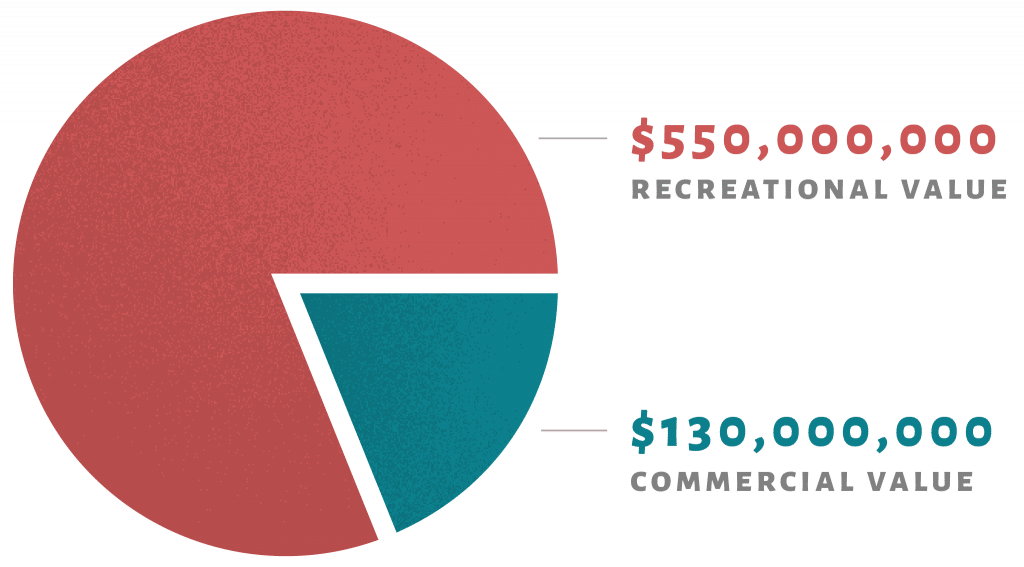Are Salmon A Keystone Species
one.
SALMON FEED COUNTLESS SPECIES
Few species accept been as fundamental to the ecological health in the Pacific Northwest as wild salmon. Their annual migrations are a phenomenon of nature and every autumn hundreds of species including bears, wolves, and eagles gather in estuaries and along rivers to banquet on the returning fish and benefit from the marine-rich nutrients they provide.

2.
SALMON ARE Primal ECONOMIC DRIVERS
Wild salmon play a disquisitional role to British Columbia'south economy, are profoundly valued in the commercial and sportfishing industries, and to their cultural and dietary importance to Indigenous Nations throughout the province.
iii.
ENDANGERED SOUTHERN RESIDENT KILLER WHALES NEED SALMON
Chinook salmon are very integral in the nutrition of Southern Resident Killer Whales (SRKW), being one of the simply things that they eat. With only 73 individuals remaining, the fate of these whales – Canada's most endangered marine mammal – is intrinsically linked to that of Chinook salmon. Many of theChinook populations are endangered while others are listed every bit threatened. Information technology comes with no surprise that numerous researchers have attributed the main driver of the declining populations of SRKWs to the vanishing Chinook salmon in recent years.
four.
SALMON Go on OLD-GROWTH FORESTS Healthy
The stop of the salmon life bicycle brings renewal to the Bully Comport Rainforest, delivering an almanac pulse of bounding main-derived nutrients. Did you know that the trees and plants that grow along the rivers of the Keen Bear depend on the deceased salmon distributed by animals and birds along the forest flooring. As the salmon decomposes, vital nutrients enter the soil and help ongoing plant growth.
5.
SALMON ARE AT THE Centre OF Ethnic Civilization
The importance of salmon extends across food and budgetary value. Throughout the Pacific Northwest, salmon, particularly sockeye salmon, have been a cardinal aspect in the worldview and life of Indigenous Peoples. In fact, the proper noun sockeye comes from a bad translation of the discussion "suk-kegh" from the Halkomelem language (part of the Declension Salish linguistic communication family unit) which means reddish fish. Many Indigenous nations have often been referred to as, "salmon people". Since fourth dimension immemorial, Indigenous Peoples have depended on the wild Pacific salmon as an important source of nutrient and for trading. The wild Pacific salmon are deeply embedded in their culture and identity.
half-dozen.
SALMON INSPIRE Ecology Activity ON ALL FRONTS
Wild salmon are a keystone species impacting ocean, freshwater, and terrestrial ecosystems in unique and profound ways. In our unified efforts to protect salmon in the Pacific Northwest, other environmental issues are often brought to the forefront of policy discussion such as watershed health, open up-net fish farms, mining, logging, and dam edifice.
7.
WILD SALMON IS A Beneficial Repast FOR HUMAN HEALTH
Wild salmon, like many species of fish, are some of our earth'southward last natural foods. When fished responsibly, salmon provide a variety of health benefits through man consumption. They are high in protein, yet low in calories and contain a health-promoting essential fat called omega-iii which helps minimise the risk of heart disease and diabetes. Farmed Atlantic salmon are not almost as nutritious and are harming our coastal ecosystems through the spread of disease and pollutants.
Are Salmon A Keystone Species,
Source: https://pacificwild.org/7-reasons-why-salmon-count/
Posted by: hughesbegadd.blogspot.com


0 Response to "Are Salmon A Keystone Species"
Post a Comment